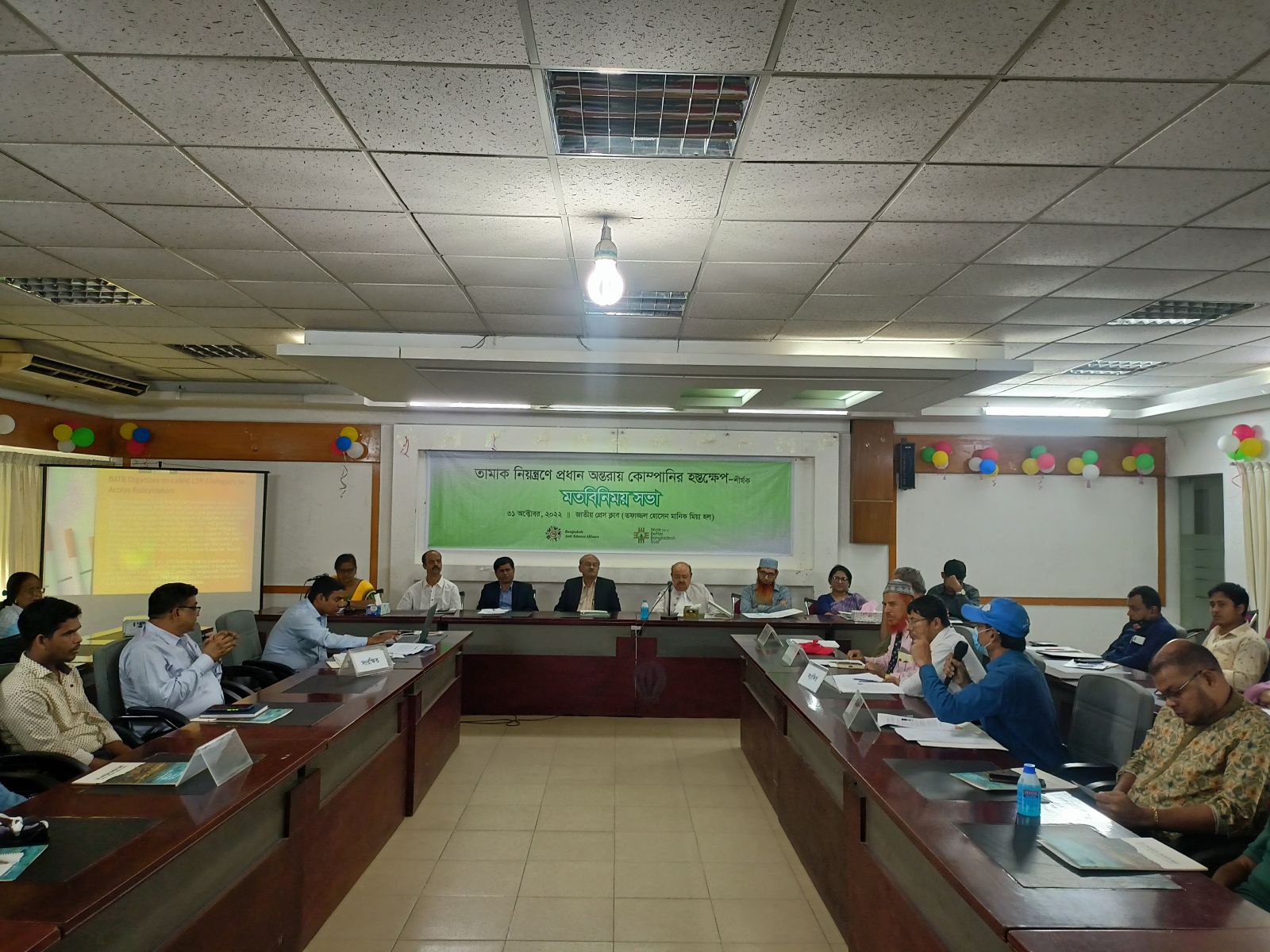
C onsidering the harmful effect of tobacco, the government is taking consistent and multi-pronged steps, including implementing laws and strengthening policies to control tobacco. But the cause of great concern is that despite the many positive initiatives taken by the government to control tobacco, tobacco companies have long been influencing the implementation of laws and the formulation of supporting policies, which is creating a major obstacle in the implementation of the commitment of the honorable Prime Minister to build a tobacco-free Bangladesh by 2040 to improve public health. With the emphasis on the above issues, today, 31 October 2022, at 11:00 am, a discussion meeting titled "Interference by companies in tobacco control" was organized at Tofazzal Hossain Manik Mia Hall of National Press Club under the initiative of Bangladesh Anti-Tobacco Alliance and WBB Trust.
onsidering the harmful effect of tobacco, the government is taking consistent and multi-pronged steps, including implementing laws and strengthening policies to control tobacco. But the cause of great concern is that despite the many positive initiatives taken by the government to control tobacco, tobacco companies have long been influencing the implementation of laws and the formulation of supporting policies, which is creating a major obstacle in the implementation of the commitment of the honorable Prime Minister to build a tobacco-free Bangladesh by 2040 to improve public health. With the emphasis on the above issues, today, 31 October 2022, at 11:00 am, a discussion meeting titled "Interference by companies in tobacco control" was organized at Tofazzal Hossain Manik Mia Hall of National Press Club under the initiative of Bangladesh Anti-Tobacco Alliance and WBB Trust.
In the event, with the help of "The Union," the WBB Trust's research report on tobacco company intervention in the last year (September 2021 - September 2022) regarding the intervention of tobacco companies in the formulation of policies supporting the development of public health also research titled "Interference by big Tobacco and Affiliates in tobacco control in South Asia was presented. Shahnaz Sharmin, chief reporter of Nagrik TV, Masum Billah, senior Reporter of Share Biz , and Project Officers of WBB Trust Samiul Hasan Sajib and Arif Hossain presented two articles in the discussion meeting. Syeda Anonna Rahman, Head of Program of WBB Trust, conducted the Program. Shafiqul Islam (Country manager of Vital Strategies), Meer Moniruzzaman (Editor of Daily Share Boji Karcha), Sushant Sinha (Senior Reporter of Ekattar Television), Helal Ahmed (Prattasha Anti-drug organizations) and Gaous Pearee (Director of WBB Trust) were presented as an expert negotiator.
WBB Trust's research has found evidence of tobacco company interference in almost all policies that aid tobacco control in Bangladesh. A total of 312 interceptions have been received in the areas of tobacco tax, smuggling, information dissemination of fraud or money laundering, tobacco cultivation, etc. Another study on the impact of tobacco companies conducted in four countries (Bangladesh, India, Nepal, and Sri Lanka) also highlighted the situation in Bangladesh. According to the data of the research report, there is no policy made by the government regarding the CSR activities of tobacco companies in Bangladesh. As a result, tobacco companies are conducting their CSR activities. Through this activity, they are getting a chance to create a positive image of the company in society along with branding their cigarette products.
Mr. Hussain Ali Khondkar said that the uncontrolled supply of tobacco products in the retail market and Interference by companies are the main obstacles to tobacco control. Taking advantage of the weakness of the Tobacco Control Act, it is now necessary to formulate a proposal of the Tobacco Control Act to solve the obstacles that the companies have been creating in tobacco control for so long.
Sushant Sinha said tobacco companies have several high-level bureaucrats in the government, leaving them room to interfere at the policy-making level. He opined that there is a need to have a specific policy for compulsory land tax and corporate social responsibility (CSR) for tobacco land.
Mr. Mozaffar Hossain Paltu said that to save Bangladesh from possible famine during the transitional period of the whole world, farmers should be encouraged to cultivate other vegetables and fruits instead of tobacco cultivation. In addition to making the licensing system mandatory for tobacco control, accurate information about the economic damage caused by tobacco should be disseminated more and more in the media.
The meeting discussed how tobacco companies interfere with the government's tobacco control policy at certain times of the year, especially before the national budget announcement. Speakers said various countries worldwide are taking steps to curb tobacco company influence through state laws or codes of conduct. To improve public health, strict control of companies, withdrawal of shares from tobacco companies to the government, and the formulation of a code of conduct following Article 5.3 of the Framework Convention on Tobacco Control (FCTC) are necessary to stop tobacco company interference.
Representatives of CTFK, Aid Foundation, NATAB, DORP, TCRC, Gram Bangla Unnayan Songstha, Nari Pokkho, Sishuder Mukto Byo shevon, DAS, Dhaka Ahsania Mission, NASF, Dishari, Progga, and various print and electronic media personalities were present in the meeting.
